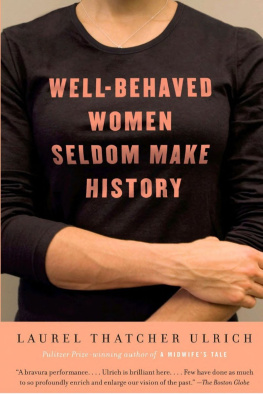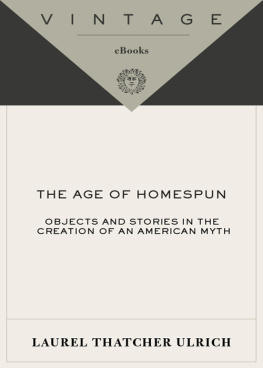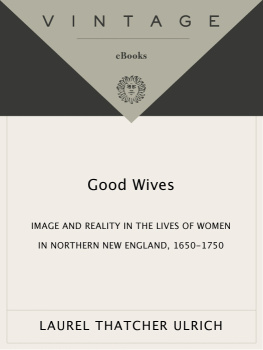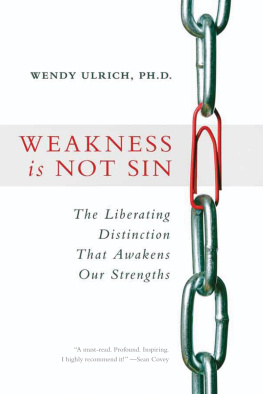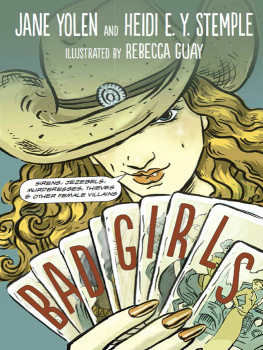
CONTENTS
Chapter One
THREE WRITERS
Chapter Two
AMAZONS
Chapter Three
SHAKESPEARES DAUGHTERS
Chapter Four
SLAVES IN THE ATTIC
Chapter Five
A BOOK OF DAYS
Chapter Six
WAVES
Afterword
MAKING HISTORY
For my students
But the history of the world shows the vast majority, in every generation, passively accept the conditions into which they are born, while those who demand larger liberties are ever a small, ostracized minority, whose claims are ridiculed and ignored.
E LIZABETH C ADY S TANTON, Eighty Years and More, 1898
For all the dinners are cooked; the plates and cups washed; the children set to school and gone out into the world. Nothing remains of it all. All has vanished. No biography or history has a word to say about it. And the novels, without meaning to, inevitably lie.
V IRGINIA W OOLF, A Room of Ones Own, 1929
If I wished to tell you all the great benefits which have come about through women, it would require much too long a book.
C HRISTINE DE P IZAN, The Book of the City of Ladies, 1405
ILLUSTRATIONS
THE SLOGAN
S ome time ago a former student e-mailed me from California: Youll be delighted to know that you are quoted frequently on bumpers in Berkeley. Through a strange stroke of fate Ive gotten used to seeing my name on bumpers. And on T-shirts, tote bags, coffee mugs, magnets, buttons, greeting cards, and websites.
I owe this curious fame to a single line from a scholarly article I published in 1976. In the opening paragraph, I wrote: Well-behaved women seldom make history. That sentence, slightly altered, escaped into popular culture in 1995, when journalist Kay Mills used it as an epigraph for her informal history of American women, From Pocahontas to Power Suits. Perhaps by accident, she changed the word seldom to rarely. Little matter. According to my dictionary, seldom and rarely mean the same thing: Well-behaved women infrequently, or on few occasions, make history.1 This may be one of those occasions. My original article was a study of the well-behaved women celebrated in Puritan funeral sermons.
In 1996, a young woman named Jill Portugal found the rarely version of the quote in her roommates copy of The New Beacon Book of Quotations by Women. She wrote me from Oregon asking permission to print it on T-shirts. I was amused by her request and told her to go ahead; all I asked was that she send me a T-shirt. The success of her enterprise surprised both of us. A plain white shirt with the words Well-behaved women rarely make history printed in black roman type became a best-selling item. Portugal calls her company one angry girl designs. Committed to taking over the world, one shirt at a time, she fights sexual harassment, rape, pornography, and what she calls fascist beauty standards.2
Her success inspired imitators, only a few of whom bothered to ask permission. My runaway sentence now keeps company with anarchists, hedonists, would-be witches, political activists of many descriptions, and quite a few well-behaved women. It has been featured in CosmoGirl, the Christian Science Monitor, and Creative Keepsake Scrapbooking Magazine. According to news reports, it was a favorite of the pioneering computer scientist Anita Borg. The Sweet Potato Queens of Jackson, Mississippi, have adopted it as an official maxim, selling their own pink-and-green T-shirt alongside another that reads Never Wear Panties to a Party.
My accidental fame has given me a new perspective on American popular culture. While some women contemplate the demise of feminism, others seem to have only just discovered it. A clerk in the Amtrak ticket office in D.C.s Union Station told a fellow historian that all the women in her office wore the button. I couldnt resist telling her that I was acquainted with you, and she just lit right up, and made me promise to tell you that the women at the Amtrak office thank you for all your words of wisdom.
I do, in fact, get quite a bit of fan mail. Recently a woman I had never met wrote to tell me she had seen someone wearing the T-shirt in a New York City subway. She wanted to know where to buy a shirt for herself, since she was one of the named plaintiffs in a gender discrimination suit against a major corporation. I have had notes thanking me for the slogan from a biology instructor at a community college on the White Mountain Apache Reservation in Arizona, from the program coordinator in a Massachusetts nursing home who started a Wild Womens Group for the residents there, and from the director of an Ohio homeless legal assistance program. A Massachusetts educator wrote to tell me she had painted my words and other inspiring quotations on the front hood of her 1991 Honda Civic, then covered the body of the car with the names of high-achieving women throughout history.
One of the most amusing e-mails was from an undergraduate who asked if I could give her the original source of the quotation. She wanted to use it in her honors thesis, and she didnt think her adviser would approve of a footnote to a T-shirt. The most surprising, given the origins of the quote, was from a woman named Lori Pearson who told me that my words had helped her write a funeral eulogy for her best friend, Kathy Thill, who was the first woman to become an electric designer for a public utility in Minnesota. She said Thill was spunky, courageous, and just a helluva lot of fun.3
Other uses of the quote have been less inspiring. While standing at the check-out counter of an independent bookstore, I discovered my name and sentence on a dusky blue magnet embellished with one leopard-print stiletto-heeled shoe above a smoldering cigarette in a long black holder. Even more unsettling was finding a website selling T-shirts printed with both my name and a grainy photograph of me standing at a lectern. When I e-mailed to ask why the proprietors were selling my picture without permission, they responded, I guess we are not very well-behaved girls.
The ambiguity of the slogan surely accounts for its appeal. To the public-spirited, it is a provocation to action, a less pedantic way of saying that if you want to make a difference in the world, you cant worry too much about what people think. To a few it may say, Good girls get no credit. To a lot more, Bad girls have more fun. Its popularity proves its point. Nobody has proposed printing T-shirts with any of the other one-liners in my article on funeral sermons. It is hard to imagine the women of Amtrak voluntarily wearing buttons that read, The real drama is in the humdrum. Nor do I think the Wild Women of that Massachusetts nursing home would be cheered up by They never asked to be remembered on earth. And they havent been. Kay Mills certainly knew what she was doing when she picked one snappy sentence from that article about sermons.
But because I am a historian, I cant quite leave it at that. For some time now Ive been collecting responses to the slogan, puzzling over the contradictory answers I have received, and wondering why misbehavior is such an appealing theme. It is hard to tell whether this is about feminism, post-feminism, or something much older. One thing it doesnt appear to have a lot to do with is history, at least not the kind that comes in books. For most people, the struggle is with the here and now, and with norms of good behavior that seem outdated yet will not go away.
Connie Schultz, a columnist for the Cleveland Plain Dealer, keeps a bumper sticker on her desk. She says that when men pass her desk, they sometimes smile, sometimes snicker. One man read the words aloud, frowned, then pointed to a photo Schultz had on her desk of a friend with a newborn baby. Thats how women make history, he huffed, then walked away. In contrast, women visiting her office usually have an a-ha response. Schultz thinks they are remembering the lessons in good behavior they learned in girlhood, lessons she herself experienced: Considerate meant deferential. Respectful was obedient. Polite was silent. No one likes a know-it-all, we were told. And so we acted as if we knew nothing at all. As a journalist, Schultz had to overcome that conditioning to take on gritty topics usually reserved for male reporters. In 2005, her columns in support of the weak, the oppressed, the underdog won her a Pulitzer Prize.4
Next page
